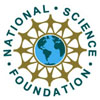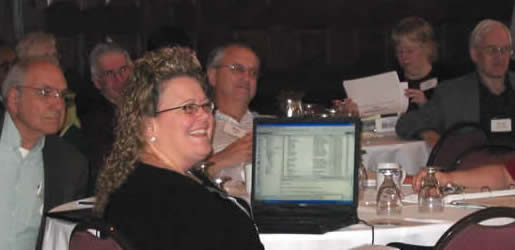Forty-nine Faculty and Business Partners in Eight Teams from Six States Attend Institute.
Meeting at the historic Union Station in Nashville, teams from six states gathered in the evening of November 16th and worked together through noon on November 21st to participate in a learning environment to experience and examine innovative approach to technological education, the Problem-based Case Study approach.
As a result of the Institute, participants learned the underlying principles of approach through immersion learning experiences in community with colleagues from around the country and Institute leaders who have expertise in foundational areas underlying the approach, i.e., developing adaptive expertise, building business partnerships, implementing IT skill standards, structuring authentic performance assessments, designing instructional strategies, and facilitating learning experiences.
A Pre-Institute half-day session prepared newcomers with an orientation to the basics of PBCSs. The Institute began with a dinner and program to frame the vision and overall structure for working in teams, learning how to use design tools, and designing of a PBCS.
Day 1 of the Institute set the context for Institute as participants work through an actual problem-based case study from a business situation. Participants also reviewed key points from each of the essential foundational areas. Teams reported insights gained from the day at dinner in the evening.
Day 2 of the Institute focused on design by applying basic principles of the approach to structuring content, creating environment, and scaffolding learning through instruction, curriculum and assessment. Participants attended four 1 ½ hour workshops on aligning IT skill standards, building business partnerships, creating authentic performance assessments, and designing instructional strategies. At the end of the day teams gathered to make plans for designing, developing and implementing their problem-based case study using what they experienced.
Day 3 of the Institute focused on development of teaching and learning experiences using the PBCS approach. Each team created a problem-based case study or a curricula structure plan to apply the basic principles more broadly to curricula structures. Institute staff guided teams to incorporate essential elements. Local faculty members with experience in using the approach served as coaches.
Day 4 of the Institute focused on implementation issues such as, student engagement, scaffolding to support student learning, continuous improvement of process through peer review and revision, subsequent impact of innovative approaches to teaching and learning on the institution, continued faculty support, product development and dissemination.
Celebration and Closing during Sunday Brunch teams reported out the results of their work, viewed a media presentation of the week, completed an evaluation, and received certificates of achievements. Plans for continuing to build the community were a vital part of the closing discussion.
The teams:
- produced at least a first draft or a good portion of a first draft of a Problem-based Case Study.
- worked to flesh out the initial ideas brought to the Institute in the "six-page template" and then converted those ideas into a PBCS Designer Version PBCS Template.
- included media pieces in your PBCS - audio and video and digital photos.
- presented your PBCS to two other teams, heard their feedback, discussed the issues of development, and then helped the other teams in your group.
- reported out PBCS from the perspective of "backward design" - Identify desired results; determine acceptable evidence; and plan learning experiences and instruction.
- stuck with a very full schedule with great enthusiasm and energy, never stopped asking questions, laughed a lot, and worked hard.
FEEDBACK at the end of the Institute: What aspect of the Institute helped you the most?
“Pre-institute and Institute exercises on the first day; the notebook and CD - tools are easily transferable. Thank you!! Exposure to students’ perspectives on the value of problem based case studies. It gave me the incentive to keep on the task when it was difficult.”
“Working in teams; correlating and learning from "experts"; Learning about flash "set the stage" techniques; Participation in the first case problem and seeing the delivery of information method.”
“Revisiting the PBCS process and how all of the elements fit together when creating case studies.”
“Learning the process to get life experiences for students; Learning how to get partners involved in the delivery of life experiences.”
“Contacts; modeling of best practices in training; content; experience with PBBS.”
“The immersion case study and the demonstration class held with the real teacher and students.”
“1) Detailed materials/binder/CD & organization of Institute. 2) Abundant technical resources/ facilitators/ consultants used excellent balance with presentations; 3) Immersion technique. 4) Excellent presentations.”
“The time with our faculty/administrator team along with the tools provided helped me focus and narrow down the process enough to apply this to our problematic situation.”
“Ruth, as a business partner with the University of Arkansas Hope CC, thank you for allowing me to participate in the Design and Implementation Institute. It clearly offers many benefits to a business partner and advances our understanding of the many different perspectives of case studies. If I can offer any additional information to your institute please feel free to contact me.”
What's NEXT?
Let us know where you are on
- continuing to develop your PBCS or
- implementing your PBCS.
Feedback
Give The Case Files staff some feedback on the impact of the D & I experience.
- Reflecting back on the Institute, what do you find helpful now?
- What would you want to be different?
Send your responses to: ruth.loring@nscc.edu



